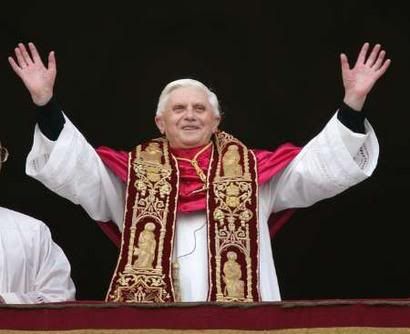Habemus Papam!

(REUTERS/Max Rossi)
Annuntio vobis gaudium magnum;
habemus Papam:
Eminentissimum ac Reverendissimum Dominum,
Dominum Josephum
Sanctae Romanae Ecclesiae Cardinalem Ratzinger
qui sibi nomen imposuit Benedictum XVI
habemus Papam:
Eminentissimum ac Reverendissimum Dominum,
Dominum Josephum
Sanctae Romanae Ecclesiae Cardinalem Ratzinger
qui sibi nomen imposuit Benedictum XVI
We have a Pope! The princes of the Roman Catholic Church have elected their fellow Cardinal Joseph Ratzinger, hailing from Bavaria, Germany, as the successor of Karol Wojtyla (John Paul II) to the throne of St. Peter. Ratzinger has chosen the papal name Benedict XVI.
At the sound of the bells, nuns pulled up their long skirts and joined others jogging toward St. Peter's Square to watch the new pope emerge. Many were delighted when Chilean Cardinal Jorge Arturo Medina Estivez stepped onto the balcony and announced [German Cardinal Joseph] Ratzinger's election.It must have been exciting there at the Vatican for normally docile nuns to "pull up their skirts" and sprint towards St. Peter's square. Even on television (c/o CNN, BBC, and EWTN - the Vatican network), the suspense could be felt. I didn't catch the news live a few minutes past midnight Manila time, but the moment I turned my TV set on (pre-tuned to CNN) at around 7am, the sight and sound of the Vatican Bells pealing jolted me out of bed. Indeed, the wait is over.
As dean of the College of Cardinals, Ratzinger had delivered a particularly sensitive homily at John Paul's funeral. He followed it up with a fiery speech to the cardinals before they entered their conclave Monday, warning about tendencies that he considered dangers to the faith: sects, ideologies like Marxism, liberalism, atheism, agnosticism and relativism - the ideology that there are no absolute truths.Are we to expect therefore a stronger clampdown on liberation theology? I recall in my old blog a comment that referred to the Christian Left as an offshoot of liberation theology. I'm not well-versed at its particulars, but from the homily of then Cardinal Ratzinger, it appears that he is to resist such moves. The thing is, he has been Pope John Paul II's top man in terms of Doctrine for the past twenty years. So will there really be an intensified campaign to stifle dissent?
"Having a clear faith, based on the creed of the church is often labeled today as a fundamentalism," he said. "Whereas relativism, which is letting oneself be tossed and swept along by every wind of teaching, looks like the only attitude acceptable to today's standards."
I'd prefer to see it as a continuation of John Paul II's dynamism and humility. He may have been controversial on his conservatism, but in my opinion what we need is more of a Pope that shall reach out to the members of the Church. Discourse on the ideologies can follow next. (Why won't we give Pope Benedict XVI the benefit of the doubt?)
If Benedict XVI is to do as his great predecessor did, then I'm happy.
Like John Paul, whose country was occupied by the Nazis, Ratzinger also has a World War II legacy.This is an interesting note. It appears that while Karol Wojtyla grew up running from the Nazis, here we have now a Pope that grew up on the other side of the fence - a citizen of the Third Reich. But, Pope Benedict XVI is said to have denied having willfully participated in the massacre of Hitler. He was young at the time, and conscription was unavoidable (like Wojtyla who actually served in the Polish army at some time). Perhaps it is Divine Providence that Ratzinger was let out of the Nazi army because of his studies for the priesthood.
In his memoirs, he wrote of being enrolled in Hitler's Nazi youth movement against his will when he was 14 in 1941, when membership was compulsory. He says he was soon let out because of his studies for the priesthood.
Two years later, he was drafted into a Nazi anti-aircraft unit as a helper, a common fate for teenage boys too young to be soldiers. Enrolled as a soldier at 18, in the last months of the war, he barely finished basic training.
As usual, other news items have been hyping the alleged angst of the Italian block in the Vatican. The article Italians Again Shut Out of Papacy sums it all up - the media hype, the unnecessary commentary on the merits and demerits of having an Italian pontiff. Have we forgotten that the word Catholic actually means universal?
And if universality in the Church is to mean respect for all points of view, including Pope Benedict XVI's conservative conservatism, then perhaps it is rightful to accept our new Holy Father, to support him, and most importantly to pray for the Lord's guidance as he steers the Church in the years ahead.
Let's be optimistic. As some observers noted, to which we should be watchful:
"The image we have of him as a theological storm trooper, particularly in the West, is not the reality," said Brian Saint-Paul of the conservative Crisis magazine. "People are going to see Cardinal Ratzinger for the man he is, quiet, truly humble, extremely popular among those who know and work with him."[News block quotes from the articles German Cardinal Becomes Pope Benedict XVI and As Cardinal, New Pope Confronted Americans.]
"I think we're in for an image reshaping."
Salvador Miranda, a Florida International University librarian and historian of the College of Cardinals, agreed: "I believe we're going to be surprised. It's one thing to be the bad cop for the pope and another to be the pope himself."



0 Comments:
Post a Comment
<< Home